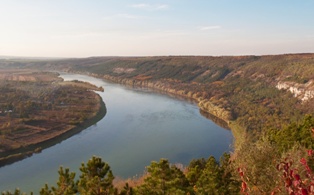 Kyiv
KyivOn 1 and 2 December 2011 official and non-governmental organization representatives of Ukraine and the Republic of Moldova met in Kyiv to further develop transboundary water cooperation on the shared Dniester River, where severe weather events, such as flooding, coupled with serious water quality problems, are a challenge to the population relying on the river and ecosystems.
On 1 December experts in the pilot project “Reducing vulnerability to extreme floods and climate change in the Dniester Basin” discussed how to reduce risks from climate change — and especially flooding — by improving the adaptive capacity of the two countries. The following day the concluding meeting of the project “Transboundary cooperation and sustainable management in the Dniester River Basin: Phase III — Implementation of the Action Programme” (Dniester III) took place.
Being part of the Environment and Security Partnership, these projects are jointly managed by the Organization for Security and Cooperation in Europe, the United Nations Environment Programme and the United Nations Economic Commission for Europe (UNECE) and support the development of the transboundary cooperation on the Dniester River Basin, including the involvement of institutions in Transnistria.
Expeditions funded by the Dniester III project indicate severe water quality problems, declining biodiversity and deteriorating ecosystems along the Dniester River, which is essential for the supply of drinking water in a large part of the basin, including the major city of Odessa (Ukraine). Moreover, a devastating flood took place in 2008, and climate change modelling suggests increased frequencies of such floods in the future. In the face of these threats an improved transboundary cooperation is a necessity.
During the climate change project meeting the first results of climate change and flood risk modelling were presented and discussed. Total water flow may increase by up to 15 per cent in the basin while summer precipitation may decrease. Participants discussed the installation of automatic flow monitoring stations, the development of an action plan on climate change adaptation and flood risk management, and how to communicate flood risks to the local population.
The achievements of the Dniester III project include:
- Development of a bilateral agreement on the sustainable management of the Dniester River that is presently going through approval processes in the two countries
- Improved cooperation and coordination between health authorities in the region responsible for the quality of drinking water
- Establishment of transboundary cooperation on biodiversity including the management of fish stocks
- Raised awareness among stakeholders and the public about the values and threats related to the Dniester basin.
The Dniester River, one of the largest Eastern European rivers. Along with supply of drinking water, hydropower generation and fisheries are other important sectors it serves. The river starts in the Ukrainian Carpathian mountains, flows through the Republic of Moldova and re-enters Ukraine where it discharges into the Black Sea. In the Republic of Moldova, the river marks the border with the breakaway region of Transnistria.
For further information please visit: http://www.unece.org/env/water/eeurope.html and http://www.unece.org/env/water/water_climate_activ.html, or contact:
Ms Sonja Koeppel and Mr. Bo Libert
UNECE
Phone: +41 (0)22 917 2396
E-mail: [email protected], [email protected]
Note to Editors:
The joint Organization for Security and Cooperation in Europe (OSCE)-United Nations Environment Programme (UNEP)-UNECE project Transboundary cooperation and sustainable management in the Dniester river basin: Phase III — Implementation of the Action Programme is the third and final phase of a programme directed towards the development of transboundary water cooperation on the Dniester River and was funded by the Finnish and Swedish Governments.
The UNECE programme of pilot projects on climate change adaptation in transboundary water basins aims to support countries in their efforts to develop jointly adaptation strategies and measures. The programme includes projects managed by UNECE as well as by other organizations. UNECE projects, funded by Finland, Sweden, Switzerland and the Netherlands, cover the following river basins: the Chu and Talas, Dniester, Neman and Sava. The programme also includes a platform for exchanging experience with regular meetings as well as an Internet site (http://www1.unece.org/ehlm/platform/display/ClimateChange/Welcome).
The Environment and Security Initiative(ENVSEC; see envsec.org) was established in 2003 and includes OSCE, the Regional Environmental Centre for Central and Eastern Europe, the United Nations Development Programme, UNECE and UNEP. ENVSEC works to assess and address environmental problems, which threaten or are perceived to threaten security, societal stability and peace, human health and/or sustainable livelihoods, within and across national borders in conflict prone regions.

